Amazon Buying Goodreads: Industry Reactions
 Amazon is buying the popular book-focused social networking site Goodreads, which was founded in 2007 and now has more than 16 million members. The acquisition is expected to close by July. Goodreads' headquarters will remain in San Francisco, and its management is expected to stay in place.
Amazon is buying the popular book-focused social networking site Goodreads, which was founded in 2007 and now has more than 16 million members. The acquisition is expected to close by July. Goodreads' headquarters will remain in San Francisco, and its management is expected to stay in place.
As the leading social networking site devoted to books, GoodReads has been considered an important element in addressing the "discoverability" problem that grew with spread of e-books and Amazon and the collapse of Borders: How would readers discover books if fewer of them were visiting the best source for learning about new books, bricks-and-mortar bookstores?
In one fell swoop, Amazon, whose algorithms for recommending books have shown limited effectiveness, now owns one of the major tools built to address the problem it created. On the Goodreads blog, CEO and co-founder Otis Chandler said the site "will continue to be the wonderful community that we all cherish. We plan to continue offering you everything that you love about the site--the ability to track what you read, discover great books, discuss and share them with fellow book lovers, and connect directly with your favorite authors--and your reviews and ratings will remain here on Goodreads. And it's incredibly important to us that we remain a home for all types of readers, no matter if you read on paper, audio, digitally, from scrolls, or even stone tablets."
On the Goodreads blog, CEO and co-founder Otis Chandler said the site "will continue to be the wonderful community that we all cherish. We plan to continue offering you everything that you love about the site--the ability to track what you read, discover great books, discuss and share them with fellow book lovers, and connect directly with your favorite authors--and your reviews and ratings will remain here on Goodreads. And it's incredibly important to us that we remain a home for all types of readers, no matter if you read on paper, audio, digitally, from scrolls, or even stone tablets."
But judging from the reaction of booksellers, publishers and some Goodreads users, the process may not be so easy. The overwhelming feeling expressed yesterday on Twitter and Facebook was surprise and disappointment. @NextGenAuthors tweeted us: "Hey, your April Fool's edition doesn't come out until Monday!" Many indies and their fans promptly cancelled their accounts.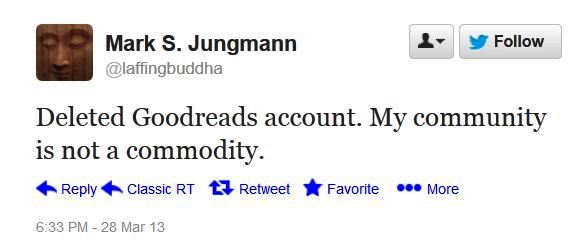
In response to Chandler's comment that "We truly could not think of a more perfect partner for Goodreads as we both share a love of books and an appreciation for the authors who write them," Jarek Steele of Left Bank Books, St. Louis, Mo., wrote on his blog: "Really, Goodreads? You've forsaken all the other opportunities to partner with independent bookstores, Kobo, even Barnes & Noble & the Nook? How about iPad? Also, who at Amazon has a love of books or authors?"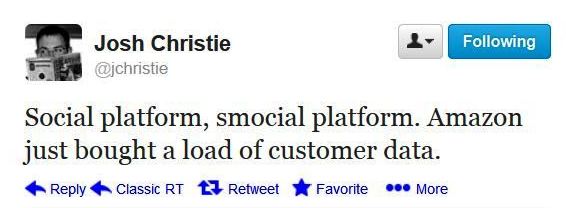
Only last year, Amazon and Goodreads had a public fight that led to Goodreads choosing to use Ingram data instead of Amazon's because of Amazon's requirement that its data not link to another retailer. There was no word on how this might change.
Goodreads has also been marked by a kind of openness that runs contrary to Amazon's penchant for secret. Otis Chandler has spoken at many conferences, giving details about site usage, and Goodreads shares information with publishers. It's likely all that will change very soon.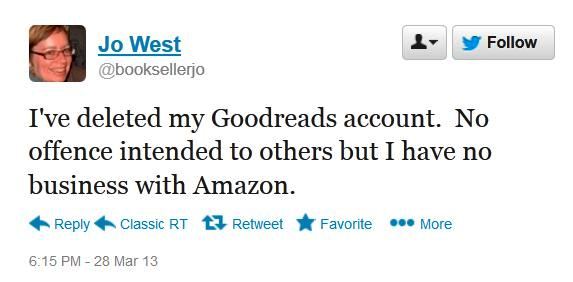
Wired summed up this feeling well, beginning its story on the Amazon purchase of Goodreads with this: "Amazon looked back to its roots in bookselling and forward to its future as the global overlord of all reading and writing by announcing its plan today to purchase social reading site Goodreads."
Forbes called the move a slap in the face of publishers, writing that it's no coincidence that the deal came seven weeks after Penguin, Hachette and Simon & Schuster launched Bookish.
"It's a brilliant move by Amazon," Mike Shatzkin of the Idea Logical Co. told the Wall Street Journal. "If you are a book marketer, the two places you think about the most in terms of online marketing opportunities are Amazon and Goodreads." He added, "It makes me question whether Amazon's competitors are awake. How could they let this happen?"
And in his inimitable style, Knopf's Paul Bogaards tweeted, "That's what all you morons get for sharing your books online."
---
Editor's Note: Judging from our e-mail over the last 12 hours, many in the industry believe that the main reason Amazon bought Goodreads is to bolster its discoverability problem. Although we don't usually "shelf promote," please indulge us a moment. Two years ago, the Shelf launched its consumer publication, Shelf Awareness for Readers, a free twice-weekly customized newsletter that helps indies help their customers discover the best 25 books published that week and that drives them back to their local store for purchase. We now have 50 partnership stores, with 200,000 subscribers; we've helped those stores to sell more and more books and helped them reinforce customers' faith that their local indie is the best place for learning what to read next. To find out more information about our program, go to shelf-awareness.com/bookstores.html.



SHELFAWARENESS.1222.S1.BESTADSWEBINAR.gif)


SHELFAWARENESS.1222.T1.BESTADSWEBINAR.gif)
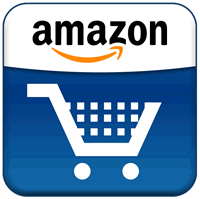 The New York State Court of Appeals
The New York State Court of Appeals 
 Effective Tuesday, U.S. libraries can offer Penguin e-books
Effective Tuesday, U.S. libraries can offer Penguin e-books  Black Dog & Leventhal and its distributor, Workman Publishing, have contributed $8,000 in special royalties from the sale of My Bookstore: Writers Celebrate Their Favorite Places to Browse, Read, and Shop, edited by Ronald Rice, to the American Booksellers Foundation for Free Expression.
Black Dog & Leventhal and its distributor, Workman Publishing, have contributed $8,000 in special royalties from the sale of My Bookstore: Writers Celebrate Their Favorite Places to Browse, Read, and Shop, edited by Ronald Rice, to the American Booksellers Foundation for Free Expression. The American Booksellers Association released its schedule-to-date of
The American Booksellers Association released its schedule-to-date of  Last Thursday the Rainbow Road Barnes & Noble in Las Vegas, Nev., hosted the launch party for Vicki Pettersson and The Lost, the second book in her Celestial Blues series (Harper Voyager). Here she shows off the delicious cover.
Last Thursday the Rainbow Road Barnes & Noble in Las Vegas, Nev., hosted the launch party for Vicki Pettersson and The Lost, the second book in her Celestial Blues series (Harper Voyager). Here she shows off the delicious cover.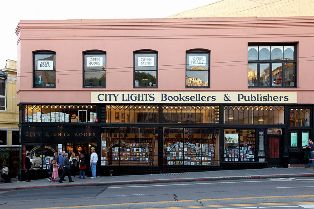 Congratulations to
Congratulations to  Let's Bring Back: The Lost Language Edition: A Collection of Forgotten-Yet-Delightful Words, Phrases, Praises, Insults, Idioms, and Literary Flourishes from Eras Past
Let's Bring Back: The Lost Language Edition: A Collection of Forgotten-Yet-Delightful Words, Phrases, Praises, Insults, Idioms, and Literary Flourishes from Eras Past Rebekah Lyons is the author of Freefall to Fly: A Breathtaking Journey Towards a Life of Meaning (Tyndale, April 9, 2013). She and her husband, Gabe, co-founded
Rebekah Lyons is the author of Freefall to Fly: A Breathtaking Journey Towards a Life of Meaning (Tyndale, April 9, 2013). She and her husband, Gabe, co-founded  Book you're an evangelist for:
Book you're an evangelist for: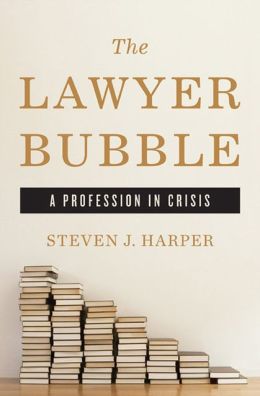 The Lawyer Bubble is a cogent critique of the legal profession by Steven J. Harper, who speaks with authority. For 25 years, he was a partner at the Chicago megafirm of Kirkland & Ellis, after which he became an adjunct professor at Northwestern University and its law school. Yet the two types of institutions at which he's spent his professional career--a large law firm and a law school--are at the heart of what he believes are the profession's most serious ills.
The Lawyer Bubble is a cogent critique of the legal profession by Steven J. Harper, who speaks with authority. For 25 years, he was a partner at the Chicago megafirm of Kirkland & Ellis, after which he became an adjunct professor at Northwestern University and its law school. Yet the two types of institutions at which he's spent his professional career--a large law firm and a law school--are at the heart of what he believes are the profession's most serious ills.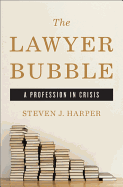
 This past Monday marked the first anniversary of
This past Monday marked the first anniversary of  "I have felt very close to and lit up by Tabucchi's work since I first began to read him years ago," Jill Schoolman, Archipelago's publisher, told me. "I believe it's his own profound mixture of humanity (on both the individual/local and more universal planes), insight, his irrepressible need to play, his elusive ability to infuse dream with earthly matters, his fierce devotion to human dignity, and his exploratory ways--basically his kaleidoscopic mind and rare ability to love--that draw me to his work. Nothing is too small to illuminate for us, and nothing is too large to begin to chip away at, alter or ponder. I return to his books the way I feel the deep urge to return to old friends."
"I have felt very close to and lit up by Tabucchi's work since I first began to read him years ago," Jill Schoolman, Archipelago's publisher, told me. "I believe it's his own profound mixture of humanity (on both the individual/local and more universal planes), insight, his irrepressible need to play, his elusive ability to infuse dream with earthly matters, his fierce devotion to human dignity, and his exploratory ways--basically his kaleidoscopic mind and rare ability to love--that draw me to his work. Nothing is too small to illuminate for us, and nothing is too large to begin to chip away at, alter or ponder. I return to his books the way I feel the deep urge to return to old friends." While that "handseller retail translation" theory I mentioned earlier may exist only in my imagination or dreams (a prospect I suspect both Pessoa and Tabucchi would approve of), I'm deeply curious about the actual process of translating Tabucchi. I asked Cooley how she and Romani, her husband, opened the door of Il tempo invecchia in fretta for English-language readers.
While that "handseller retail translation" theory I mentioned earlier may exist only in my imagination or dreams (a prospect I suspect both Pessoa and Tabucchi would approve of), I'm deeply curious about the actual process of translating Tabucchi. I asked Cooley how she and Romani, her husband, opened the door of Il tempo invecchia in fretta for English-language readers.